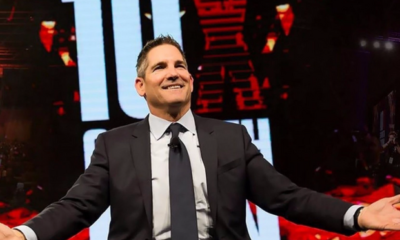Success Advice
4 Key Principles For Finding Your Path to Greatness

Success is defined in different ways by different people, but more and more it has become synonymous with money and status.
Real success, however, is less about results or a bottom line, and more about the process of achieving goals and dreams.
Many business people today are overwhelmed by the need to maintain results-driven success. Once we decide that the results are all that matter, then success comes at high price. We find ourselves making sacrifices and compromises that were once unacceptable. We trade today for some future payoff. When that payoff comes, we realize it can never be enough. And, when the results we work so hard for don’t materialize, we label that failure. It’s an impossible model to sustain for a lifetime.
Fortunately, there is another way.
In my book, Own YOUR Success, I contrast results-driven success with a much more balanced approach. The key principles are ones that anyone can put into practice immediately.
The first principle is Attain Belief in Yourself, which I break into five keys:
1. Accept the truth. Acknowledging the person you are today is the key to becoming the person you want to be and, ultimately, to attaining belief in yourself. There is a big difference between failing and not getting the results we want. Instead of seeing failure, see opportunities for growth and change.
2. Speak the truth. Be honest about your past behaviors and habits. While it may be difficult to acknowledge them, burying those parts of our lives makes us feel like victims, amplifying our fear and pain. Shedding light on the past, by talking with a trusted friend or professional, frees us.
3. Breathe through the truth. Avoid reacting from a place of pain or anger – no matter how much you believe you are right. Be open to changing your perspective. Treat yourself lovingly. Do not self-destruct.
4. Process the truth. Give yourself time and space to find your equilibrium. Developing belief in yourself means gaining confidence that will lead to a stronger foundation.
5. Create a plan based on the truth. Changing entrenched behaviors and mindsets takes time, and sometimes they return. Stay strong. Continue to believe and actively engage in this process. Define how you want to live your life from where you are right now.
Once you attain belief in yourself, you can believe in others – as all great leaders do. Use meditation and mindfulness to gain focus and clarity. This allows you to act with purpose, intention, and awareness at all times.
The second principle is Act with Courage and Integrity.
Whether you are the CEO, in middle management, or in an entry-level position, when you act with courage and integrity, it inspires others to do the same. A big part of that is appreciating all people and the selfless acts and sacrifices they make every day.
The third principle is Create Your Prizefighter Day – Do Great Things!
Each day set three attainable activity goals: one personal, one professional, and one to help others. By taking action in these three areas every day, you make each day victorious. The victory is not in the results, but in the actions themselves. Even if what you do doesn’t turn out perfectly, as you may have hoped, the experience of accomplishment every day is a victory.
The fourth principle is Create a Living Legacy.
Surrender to a cause greater than yourself. Find your passion and live it every day. Work diligently toward your goal. Fight for what you believe in despite the obstacles in your path. Don’t wait to leave a legacy after you’re gone. Live that legacy every day.
Quotes Of Greatness
As human beings, our greatness lies not so much in being able to remake the world, but in being able to remake ourselves. – Mahatma Gandhi
“Greatness lies, not in being strong, but in the right using of strength; and strength is not used rightly when it serves only to carry a man above his fellows for his own solitary glory. He is the greatest whose strength carries up the most hearts by the attraction of his own.” – Henry Ward Beecher
“All greatness of character is dependent on individuality. The man who has no other existence than that which he partakes in common with all around him, will never have any other than an existence of mediocrity.” – James F. Cooper
“Man’s greatness lies in his power of thought.” – Blaise Pascal
“Those who occupy their minds with small matters, generally become incapable of greatness.” – Francois de La Rochefoucauld
“Be not afraid of greatness: some are born great, some achieve greatness, and some have greatness thrust upon them.” – William Shakespeare
Business
The Simple Security Stack Every Online Business Needs
Most small businesses are exposed online without realising it. This simple protection stack keeps costs low and risks lower.

Running a business online brings speed and reach, but it also brings risk. Data moves fast. Payments travel across borders. Teams log in from homes, cafés, and airports. (more…)
Business
If Your Business Internet Keeps Letting You Down, Read This
From smoother operations to better security, dedicated internet access is quietly powering today’s high-performing businesses.

Today, a dependable internet service is the bedrock for uninterrupted business operations. Many organizations rely on stable online connections for communication, data transfer, and customer interaction. (more…)
Did You Know
How Skilled Migrants Are Building Successful Careers After Moving Countries
Behind every successful skilled migrant career is a mix of resilience, strategy, and navigating systems built for locals.

Moving to a new country for work is exciting, but it can also be unnerving. Skilled migrants leave behind familiar systems, networks, and support to pursue better job opportunities and a better future for their families. (more…)
-

 News2 weeks ago
News2 weeks agoBrandon Willington Builds 7-Figure Business by Ignoring Almost Everything
-

 Health & Fitness3 weeks ago
Health & Fitness3 weeks agoWhat Minimalism Actually Means for Your Wellness Choices
-

 Did You Know3 weeks ago
Did You Know3 weeks agoWhy Most Online Courses Fail and How to Fix Them
-

 Business3 weeks ago
Business3 weeks agoIf Your Business Internet Keeps Letting You Down, Read This
-

 Business1 week ago
Business1 week agoEntrepreneur’s Guide to Pay Stubs: Why Freelancers and Small Business Owners Need a Smart Generator
-

 Business6 days ago
Business6 days agoThe Salary Shift Giving UK Employers An Unexpected Edge
-

 Business1 week ago
Business1 week agoThe Simple Security Stack Every Online Business Needs
-

 Scale Your Business7 days ago
Scale Your Business7 days ago5 Real Ways to Grow Your User Base Fast

























5 Comments